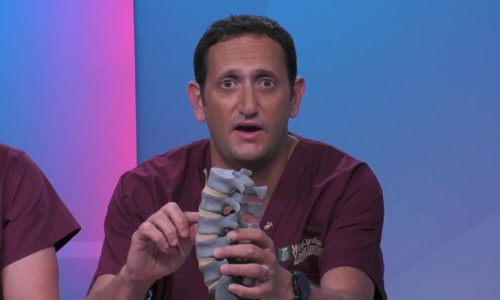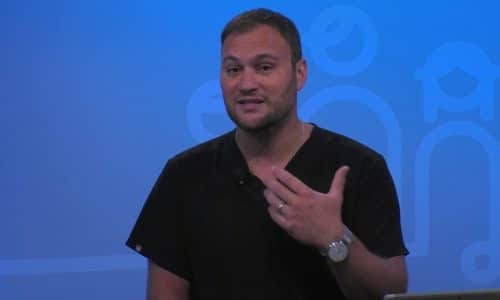Cervical Herniated Disc |
Herniated disc can occur in the neck and it can affect neural structures, explains Dr. Theresa Pazionis, Orthopedic & Spine Surgeon with Miami Cancer Institute.
The expert says Myelopathy is called when somebody has herniated discs in the neck.
Herniated discs in the neck can cause difficulties with balance bowel and bladder and it affects all the nerve roots there from down, because when herniated discs happen in the neck, they are compressing the spinal cord and every single nerve that’s below that level could be affected, the doctor explains.
Numbness, tingling or weakness in any arm and awkward walking are some of the symptoms of cervical herniated disc, she says.
Transcript
Let’s really focus on that top part of our spine the cervical section of the spine because as we mentioned herniated discs can occur in your neck and is that right is this something that you’re seeing more of I’m absolutely so we see a lot of both herniation the lumbar spine and in the cervical spine the difference really other than the location boils down to what sort of neural structures are going to be affected by the herniation so in the neck we actually have the spinal cord in the lumbar spine the court actually ends at l1 and you only have nerve roots that are coming down out of that so it’s going to be a nerve based problem versus your entire spinal cord based problem so you could have something called myelopathy when you have a herniated disc in the neck and what that is is difficulties with balance bowel and bladder as well could be a difficulty and it affects really all the nerve roots there from there down okay so let’s just say if you for hernia just gonna lower back and you’re only affecting the l4 nerve root okay we might have shooting pain down one leg or in the extreme weakness or numbness and that leg right okay if you have a herniated disc that’s compressing your spinal cord every single nerve that’s below that level could be affected so what are you feeling at that so at that point you’ll have difficulties with your balance okay so difficulties with penmanship’s or small motor tasks so I often at times ask patients make up or texting has this become a problem for you dropping things so are you dropping things on that’s your motor skills it really does so it’s the fine motor it will be patients feeling jumpier okay in terms of their reflexes so oftentimes they do get something called hyperreflexia medically and as well they’ll have frequent Falls difficulty with moving the one foot in front of the other proprioception difficulties and things like this it’s not is it just simply neck pain or were there other symptoms associated with that circle herniation it depends on how bad it is so if it’s not compressing your spinal cord that’s really the extreme and what could happen for my Appa the–okay if it’s just herniating out and touching one of the nerve roots in that case you could get numbness tingling or weakness in the arm that may go down to your fingers weakness in the hand or the arm okay okay and this is absolutely correct if it presses on your spinal cord the some tumbling or awkward walking tingling are shopsite feelings running down your body into your legs problems using your hands and arms for fine motor skills and loss of balance and coordination so that’s exactly correct you








